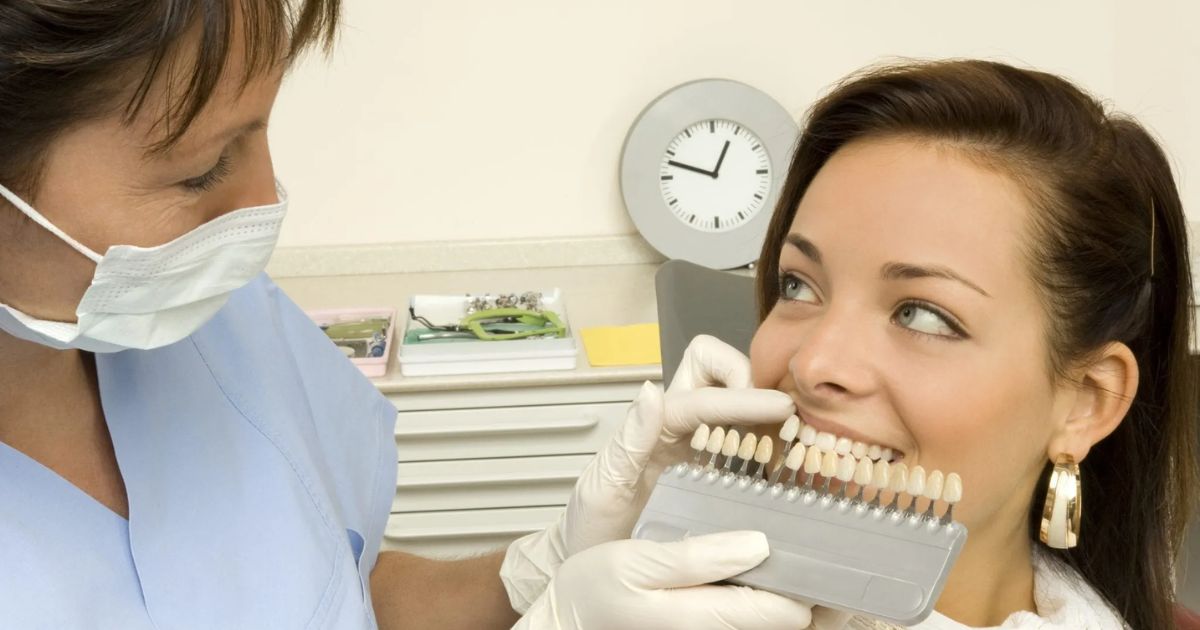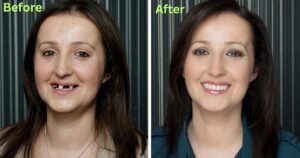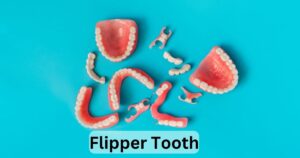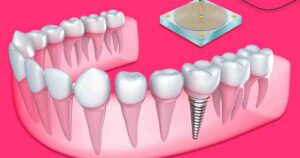Getting replacement dentures is a common concern for those who require dental prosthetics. Understanding the timeline for getting new dentures is crucial, as it allows individuals to plan accordingly and manage their expectations.
In this article, we will explore the various factors that influence the time it takes to receive replacement dentures. From the initial fitting process to the fabrication of the dentures, we will delve into the steps involved in obtaining these prosthetics.
We will discuss immediate dentures, implant-supported dentures, and the adjustment period that individuals may experience when wearing new dentures. By providing valuable insights into the timeline and process, this article aims to guide those seeking replacement dentures towards a smoother and more informed dental journey.
Key Takeaways
- The timeline for getting replacement dentures is influenced by factors such as the type of dentures needed, the condition of oral health, the complexity of the case, and the availability of the dental laboratory.
- The denture fitting process involves multiple steps and requires consideration of the patient’s oral health condition, the complexity of the case, and the availability of the dental laboratory. Consulting with a dentist is important to determine an accurate timeframe.
- The denture making process includes the fabrication of an initial wax try-in, assessment of fit, appearance, and functionality, and the creation of final dentures using a precise process that involves taking impressions, selecting materials, and crafting the dentures to ensure a comfortable and natural-looking fit.
- Immediate dentures are a same-day solution for replacing missing teeth, inserted immediately after tooth extraction. They serve as a temporary solution while the mouth heals, and adjustments may be required as the mouth changes shape. Immediate dentures provide an immediate aesthetic improvement for patients.
Denture Replacement Timeline
The denture replacement timeline can vary depending on several factors. Firstly, the type of dentures needed plays a significant role. Complete dentures may take longer to fabricate compared to partial dentures.
Additionally, the condition of the patient’s oral health and any necessary extractions or surgeries can extend the timeline. Finally, the complexity of the case and the availability of the dental laboratory can also influence the time required for denture replacement.
Denture Fitting Timeframe

To determine the denture fitting timeframe, it is essential to consider various factors such as the patient’s oral health condition, the complexity of the case, and the availability of the dental laboratory. Each patient’s situation is unique, and the time it takes for denture fitting can vary.
Typically, the process can take several weeks, as it involves multiple steps, including taking impressions, creating a custom mold, and ensuring proper fit and alignment. It is important to consult with your dentist to get an accurate timeframe for your specific case.
Denture Making Process
The denture making process begins with the fabrication of an initial wax try-in for the patient. This try-in allows the dentist to assess the fit, appearance, and functionality of the dentures. Once the try-in is approved, the final dentures are created using a precise and detailed process.
This involves taking impressions of the patient’s mouth, selecting the appropriate materials, and carefully crafting the dentures to ensure a comfortable and natural-looking fit.
| Denture Making Process |
|---|
| 1. Fabrication of initial wax try-in |
| 2. Assessment of fit, appearance, and functionality |
| 3. Creation of final dentures using precise process |
| 4. Taking impressions, selecting materials, and crafting dentures |
Immediate Dentures: Same Day Solution
Immediate dentures offer patients a same-day solution for replacing their missing teeth. These dentures are made in advance and can be inserted immediately after the extraction of the natural teeth. This means that patients don’t have to wait for a lengthy denture-making process.
Immediate dentures provide a temporary solution while the mouth heals and prepares for the final denture. Although adjustments may be required as the mouth changes shape, immediate dentures provide an immediate aesthetic improvement for patients.
Adjusting to New Dentures
After the insertion of immediate dentures, patients must undergo a period of adjustment to acclimate to their new prosthetic teeth. This adjustment period can vary from person to person, but generally, it takes a few weeks to a few months for individuals to fully adapt to their dentures. During this time, patients may experience the following emotions:
- Frustration: It can be frustrating to navigate eating and speaking with new dentures.
- Discomfort: Some discomfort, such as sore gums or an altered bite, may be experienced initially.
- Self-consciousness: Patients may feel self-conscious about their appearance or the fear of dentures slipping.
- Anxiety: Anxiety may arise due to the fear of dentures falling out or being damaged.
- Relief: Despite the challenges, patients may feel relieved to have a functional set of teeth once again.
Denture Candidates and Eligibility
Patients who are considering replacement dentures or better implants must meet certain criteria in order to be eligible for the procedure. Denture candidates typically include individuals who have lost some or all of their natural teeth due to decay, gum disease, or trauma.
Additionally, patients who have sufficient bone density in their jaws to support the dentures are considered suitable candidates. Understanding the eligibility requirements is crucial before discussing the subsequent section on the placement timeline for implant-supported dentures.
Implant-Supported Dentures: Placement Timeline
The placement timeline for implant-supported dentures can vary depending on several factors. These factors include the patient’s overall oral health, bone density, and the need for any preliminary dental procedures.
Additionally, the type of implant system being used and the individual’s healing process also play a role. It is crucial to consult with a dental professional to determine an accurate timeline for the placement of implant-supported dentures.
Immediate Dentures: Pros and Cons
Immediate dentures offer both advantages and disadvantages. One of the main advantages is that they are designed to be worn immediately after tooth extraction, providing patients with functional teeth while they wait for their permanent dentures.
This can be especially beneficial for individuals who are concerned about their appearance or need teeth for speaking and eating. However, immediate dentures may require more adjustments and may not fit as well as permanent dentures. It is important to consult with a dentist to determine if immediate dentures are the right option for you.
Denture Relining and Maintenance
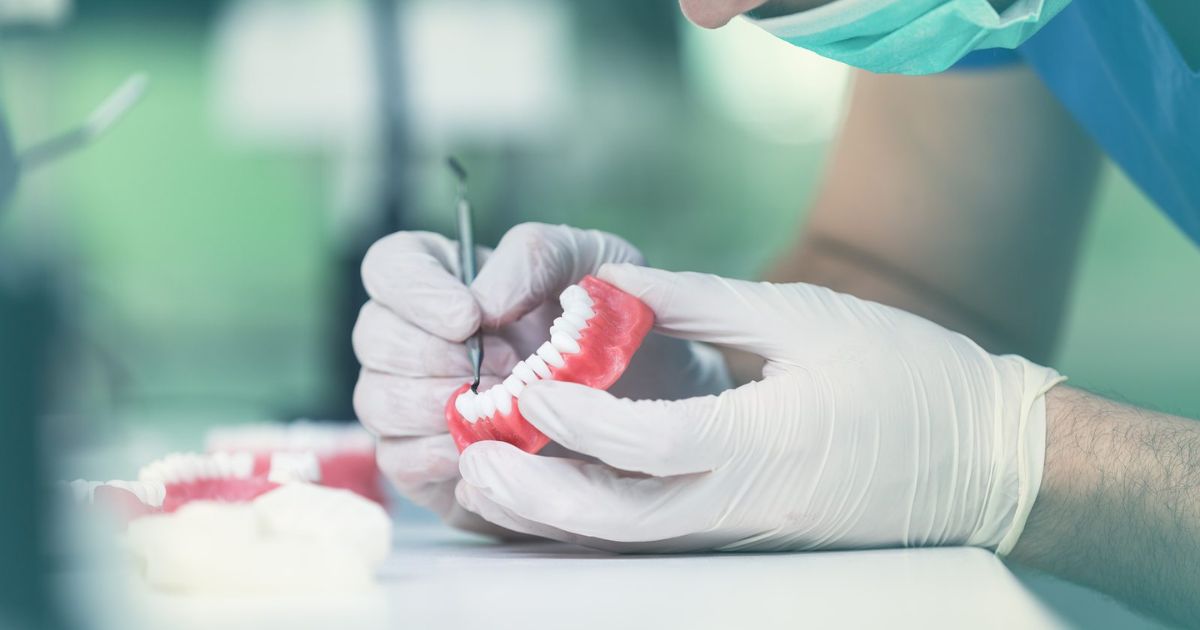
Denture relining and maintenance typically takes a few appointments to complete. During this process, the dentist will make adjustments to ensure a proper fit and comfort. Here are five important aspects to consider:
- Regular cleaning and brushing of dentures
- Soaking dentures in a denture cleaner or water overnight
- Avoiding hot liquids and hard foods that can damage dentures
- Regular dental check-ups to assess the condition of dentures
- Promptly addressing any discomfort or issues with dentures
Understanding the importance of denture relining and maintenance sets the stage for discussing the timeframe for permanent dentures.
Timeframe for Permanent Dentures
The duration for acquiring permanent dentures can vary depending on individual circumstances and treatment plans. Generally, the process of getting permanent dentures involves multiple appointments and takes several weeks to complete. After the initial consultation and measurements, the dentist will create a custom mold of your mouth.
This mold will be used to fabricate your dentures in a dental laboratory. Once the dentures are ready, you will have a fitting appointment to ensure proper fit and adjustments if necessary. The entire process can take anywhere from 4 to 12 weeks, depending on the complexity of the case and any additional procedures required.
FAQ’s
What Are the Different Types of Dentures Available for Replacement?
There are several types of dentures available for replacement, including complete dentures, partial dentures, and implant-supported dentures. Each type offers unique benefits and considerations based on the individual’s specific needs and oral health condition.
How Much Do Replacement Dentures Typically Cost?
The cost of replacement dentures can vary depending on several factors, including the type of dentures, materials used, and any additional procedures required. It is best to consult with a dental professional to get an accurate estimate.
Can I Eat and Speak Normally With Replacement Dentures?
Yes, with properly fitted replacement dentures, you can expect to eat and speak normally. Dentures are designed to restore functionality and improve your quality of life by allowing you to chew and articulate speech effectively.
Conclusion
In conclusion, the time it takes to get replacement dentures can vary depending on factors such as the type of dentures needed and the individual’s specific circumstances. Denture fitting and making processes can take several weeks or longer, while immediate dentures can be provided on the same day.
Adjusting to new dentures may take some time, and implant-supported dentures require a separate placement timeline. Denture relining and maintenance are important for long-term use. Overall, it is crucial to consult with a dental professional for accurate and personalized information regarding denture replacement.
